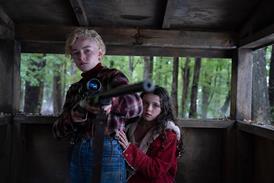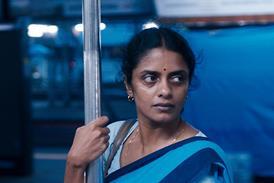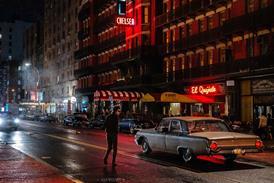Dir: Fernando Trueba. Spain. 2002. 122mins.
Lush, even exotic, set designs and costumes are the biggest draws for The Shanghai Spell (El Embrujo De Shanghai), Oscar-award winning director Fernando Trueba's (Belle Epoque) 1940s drama. Trueba's reputation, and strong international interest in his recent hits such as jazz documentary 54th Street (Calle 54) and the Penelope Cruz feature The Girl Of Your Dreams (La Nina De Tus Ojos), should help producer-distributor Lolafilms on international sales. However, the film's diffuse narrative, thin characterisations and uneven reviews will not help box-office appeal: it opened to a middling $456,429 from 195 screens. Locally, there should be added curiosity due to the polemical genesis of the project: recluse director Victor Erice (The Quince Tree Of The Sun) was attached to direct the film and developed a different script, since published, before falling out with producer Andres Vicente Gomez.
Set in post-war Barcelona, Shanghai is told from the perspective of pre-teen Dani (Tielve) as he befriends an ageing eccentric, Captain Blay (Fernan-Gomez) and falls in love with Susana (Folch), a beautiful young tuberculosis victim confined to her bed. Blay asks Dani to draw a portrait of Susana, a perfect excuse for the boy to spend lazy afternoons at her bedside. There he meets Susana's sensual but abandoned and alcoholic mother, Anita (Gil). Things become interesting when Forcat (Fernandez), a friend of Susana's absentee father Kim (Resines), moves in and weaves a tale for them of Kim's adventures in Shanghai, where he encounters a cast of mysterious characters including Chinese femme fatale Chen (Gil again).
Trueba takes his time setting up Dani's environment, introducing us to the boy's hard-working single mother, best friend Finito and, in particular, the friendship he has with the elderly Blay and his wife. The script dwells perhaps too long on these characters, who are largely irrelevant to the central narrative and ultimately disappear for the bulk of the film. The action picks up with the entry of feisty Susana, the film's best-defined role, and the late-coming Shanghai subplot, a sexy black-and-white film within the film.
The Shanghai scenes are the most entertaining, if also the least original, and are shot to mimic Hollywood movies of the same era (explicable as the only reference the characters would have for imagining such an exotic locale). Dressed like a Bogart -style private investigator, actor Resines floats through expatriate cocktail parties, opium bars and rainy ports of call. Perhaps it's because so much time is dedicated to setting up the Barcelona storyline that the parallel Shanghai tale seems to unravel too quickly before promptly evaporating into thin air.
Both the Barcelona and Shanghai settings and the 1940s wardrobe look sumptuous and era-appropriate, nods to Trueba and his veteran team of technicians: cinematographer Jose Luis Lopez Linares, production and set designers Salvador Parra and Emilio Ruiz and costume designer Lala Huete. Newcomer Folch is commanding in the role of Susana, while Tielve, who previously starred in Guillermo del Toro's The Devil's Backbone, is largely confined to wide-eyed stares. Gil and the accompanying adult cast, veterans on the local scene and frequent stars of Trueba's films, all put in respectable performances.
However, one has the impression that Trueba has tried to pack in too much good material from the novel on which his script is based. The end result is that the ambling cast of characters is shaved down to somewhat familiar types, while the multiple political, historical, artistic and cinematic layers to the story are alluded to but never allowed to cast their promised spell.
Prod cos: Lolafilms, Pyramide Productions, Shanghai Spell
Sp dist: Lolafilms Distribucion
Int'l sales: Lolafilms
Prods: Andres Vicente Gomez, Cristina Huete
Scr: Fernando Trueba, based on the novel by Juan Marse
DoP: Jose Luis Lopez Linares
Prod des: Salvador Parra
Ed: Dominique Hennequin
Music: Antoine Duhamel
Main cast: Fernando Fernan-Gomez, Eduard Fernandez, Aida Folch, Ariadna Gil, Antonio Resines, Jose Sanz, Rosa Maria Sarda, Fernando Tielve



















No comments yet